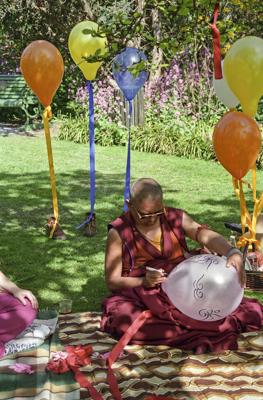Last night I mentioned that the meaning of life, the purpose of living, is to cause others happiness and to eliminate their suffering, whether it is one living being, one person, or many. Whether we serve one or many, the purpose of living is to free everyone from all their sufferings and to bring them every happiness. Therefore whoever we serve, whether it’s one person or many, we should live our life with this attitude of bringing them happiness and eliminating their problems. Then, even if it is for one day, our life has meaning. Even if the length of our life is just one hour, it has purpose. Even if the life we have is just for one minute, it has purpose. With this new way of living, with this healthy attitude to life, whatever length of life we have with this precious human body—whether we’ve got one day, one hour or even one minute—living the life with this thought to benefit others gives our life meaning. There is purpose for living even for one minute.
Therefore it is ridiculous to feel we are overwhelmed by some problem in life. We might have a situation that the mind has labeled “problem.” Our mind has changed in some way, and we have this concept that it is a problem; we have made up the concept of “problem.” Then, because we have made up this concept “problem” we find the problem. As long as we don’t create the concept that this is a problem, then there is no problem.
Because some change has happened in our life that is the opposite to what we expected or wished for, simply because of that, we feel there is a problem. We hadn’t expected this new situation, this change of circumstances. For example, if we feel something has changed in the relationship we have with somebody, a friend or companion, and we feel we are no longer together with that person, we did not expect this change to happen and we didn’t want it to happen. Our mind can’t handle the fact that this has happened—either the other person’s change of attitude to us or physically separating—and because we believe this is a problem, because of that concept, we see it as a problem.
The problem that we see is something that has come from our own wrong concept. If we were to look for the actual problem, we wouldn’t be able to find it. What is the problem? When we look for problems in our life, we cannot find them! [Rinpoche laughs] Other than labeling them a problem. By analyzing what is a problem, it is not about whatever change might have happened—the change of our friend’s attitude to us or even the distance or closeness of their physical body—it comes down to our own mind, the concept we have created in our own mind, that this is a problem. Thinking this way is our own attitude but we believe this to be true.
However, when we search for the problem outside, we cannot find it. It comes down to our own thought, our own concept, and the fact that we believe that concept. That is what makes life difficult; that is what makes it suffocating.
I would not say that there is no suffering, because then there wouldn’t be any happiness either. [Rinpoche laughs] I would have to say we couldn’t receive any happiness, any peace, if suffering didn’t exist. Generally, we are not talking about the suffering or happiness of one particular being. We are not talking that way. We are not talking about one particular place or person, just generally. If suffering didn’t exist then happiness also wouldn’t exist, peace wouldn’t exist.
It is this concept, this particular way of thinking, that is unskillful. Why? Because the effect of this concept is to not have happiness or peace. The effect of this concept is to disturb our mind, making it unhappy. Therefore, this concept which receives the label “problem,” when we analyze it, we cannot find the problem outside. It comes down to our own thought, this concept that affects our mind, robbing us of happiness and peace. That concept that labels the situation “problem” is unhealthy; it disturbs our own mind. Other than that, outside we can’t see a problem. Maybe you can see one! I am not aware of it. [General laughter]
So anyway, the point I am trying to make is that when we don’t make up the concept “bad” we then don’t believe the situation is bad, and without this fixed concept interpreting it as bad, we have freedom. When we see that the idea of “bad” comes from our own concept, we see the problem comes from the way we interpret it. Another way of putting it is that the problem doesn’t come from outside but from our own concept, from our own mind. When we recognize this, seeing how our mind has built up this concept, we have freedom in our life to have peace and happiness because we have the freedom to change the concept. We can change our attitude to life. When we change our concepts, we stop seeing problems in our life.































